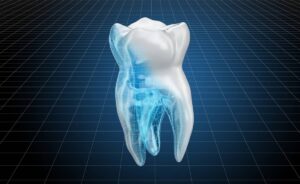How dental implants work
Implants are artificial metal screws which are placed in the jaw bones to replace the natural root of the tooth and after 2 or 3 months there will be a mechanical-chemical connection between the implant and the bone called Osseointegration, this connection is stable and will act as a strong root for the future crown.
After the recovery time, which takes 2 months for the lower jaw and 3 months for the upper jaw, the molding process will begin, a metal or a Zirconium piece called an abutment will be attached to the implant and the final restoration will be installed on the abutment.
For seniors with missing teeth, dental implants are a great solution to help restore your confidence and smile. This is what you need to know before considering a dental implant.
Advantages of dental implants over traditional dentures
Dental implants are becoming more and more popular among seniors as an alternative to traditional dentures. Dental implants are artificial tooth roots which have been surgically placed into the jawbone supporting them to act as a sturdy base for replacement teeth. Traditional dentures, on the other hand, involve at least two separate procedures: First, a dentist removes all the remaining teeth from your mouth before attaching them in place with dental cement. Then after a couple of days, you need to see a dentist again so that he/she can attach them firmly inside your mouth with clips or glue by building up bone mass around these implanted teeth slowly for about six months or longer.
The dental implant procedure is one of the most common procedures in Dentistry. It is estimated that more than 3 million people have dental implants all over the world.
Dental implants are the most advanced dental prostheses on the market today. These artificial tooth root systems are created in a dental lab and surgically placed into the jaw bone of individuals in need of tooth replacement.
There are several benefits of dental implants that make them an attractive option for seniors and individuals of all ages. Dental implants’ primary advantages are that they look and function like natural teeth. Unlike dentures, which can slip or move around in the mouth, dental implants are securely anchored in the jawbone and feel like natural teeth.
Prevention of bone loss with dental implants
Another benefit of dental implants is that they can help prevent bone loss in the jaw. When a tooth is missing, the jawbone can deteriorate over time, leading to a sunken appearance in the face and other dental problems. Dental implants stimulate the jawbone, which helps to maintain bone density and prevent bone loss.
Longevity of dental implants
The longevity of dental implants depends on various factors such as the patient’s overall health, oral hygiene practices, and the quality of the implant. In general, dental implants have a high success rate and can last for several decades or even a lifetime with proper care and maintenance.
According to research, the success rate of dental implants is about 95-98%, and they can last for 25 years or more in about 90% of cases. However, factors such as smoking, poor oral hygiene, and certain medical conditions can affect the longevity of dental implants. It’s essential to maintain regular dental check-ups and practice good oral hygiene habits, such as brushing and flossing daily, to ensure the long-term success of dental implants.
Who is a good candidate for dental implants?
It’s important to note that not everyone is a good candidate for dental implants. Individuals with certain medical conditions or habits, such as smoking, may not be eligible for the procedure. Additionally, dental implants can be more expensive than other dental prostheses, although they are often worth the investment in the long run. In general, the ideal candidate for dental implants should:
Have good overall health: Dental implant surgery involves a minor surgical procedure, so it’s essential to be in good health to minimize the risk of complications.
Have sufficient jawbone density: Dental implants require a certain amount of jawbone density to support the implant post. If the jawbone is not dense enough, bone grafting may be necessary to build up the bone.
Have healthy gums: Healthy gums are necessary to support the implant and prevent infections. If a patient has gum disease, it must be treated before implant surgery.
Be committed to good oral hygiene: Good oral hygiene habits such as brushing and flossing are essential for maintaining the longevity of dental implants.
Not smoking: Smoking can affect the success rate of dental implants by interfering with the healing process and increasing the risk of complications.
For more information, you can always book a free appointment with Dr. Maziar Shahzad Dowlatshahi as he does his best to make dental implants affordable for everyone including seniors.
Source: Health Line


